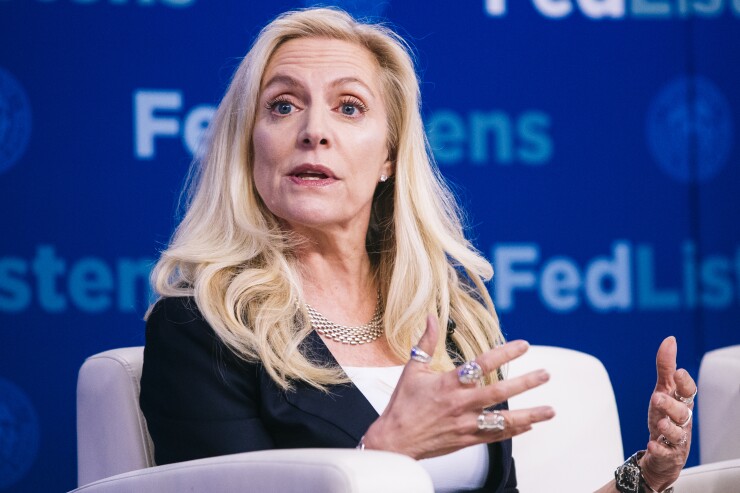As central banks around the world work to combat rampant inflation, the tightening of monetary policy could become a threat to financial stability, Federal Reserve Vice Chair Lael Brainard warned Friday morning.
"The global environment of high inflation and rising interest rates highlights the importance of paying attention to financial stability considerations for monetary policy," Brainard said in a speech. "As monetary policy tightens globally to combat high inflation, it is important to consider how cross-border spillovers and spillbacks might interact with financial vulnerabilities."
Speaking at a research conference on monetary policy and financial stability organized by the Federal Reserve Bank of New York, Brainard noted that interest rates around the world are being raised at a historically rapid pace and roughly in unison.

Nine central banks in advanced economies — the U.S., the U.K., Canada, the euro area, Australia, New Zealand, Norway, Sweden and Switzerland — have increased their benchmark rates by at least 125 basis points during the past six months. The U.S. rate has risen by 3 percentage points during that period.
For the U.S., the hikes mean that while domestic demand is suppressed, so is demand from cross-border buyers and borrowers, Brainard said. The reverse is also true, with U.S. consumers purchasing fewer foreign goods at the same time that domestic demand in those markets falls.
"Tightening in financial conditions similarly spills over to financial conditions elsewhere, which amplifies the tightening effects," Brainard said, adding that adjustments to central bank balance sheets also have ripple effects. For economies that are closely linked, like the U.S. and Europe, the impact of monetary policy changes "could be about half the size of the own-country effect when measured in terms of relative changes in local currency bond yields," she said.
This effect can be especially harmful to emerging markets, especially for borrowers of dollar-denominated debt. Brainard noted that the Fed's nominal U.S. dollar index has risen by 10% over the past year, putting additional pressure on borrowers in regions with depreciating currencies.
The Fed is watching developments on this front carefully as it weighs further adjustments to its policy rate, Brainard said, adding that these dynamics could leave certain countries even more vulnerable to exogenous shocks.
"For instance, in countries where sovereign or corporate debt levels are high, higher interest rates could increase debt-servicing burdens and concerns about debt sustainability, which could be exacerbated by currency depreciation," she said. "An increase in risk premiums could kick off deleveraging dynamics as financial intermediaries de-risk. And shallow liquidity in some markets could become an amplification channel in the event of further adverse shocks."
Brainard's view on the financial stability risks of changing monetary policy contrasts with the stance Fed Chair Jerome Powell took on the subject earlier this year.
After the Federal Open Market Committee meeting in July, when the Fed elected to raise rates by 75 basis points, Powell said he saw "a pretty decent picture" for financial stability, pointing to levels of banks capital, household balance sheets and asset values.
"From a financial stability perspective … asset values are down, which … lowers vulnerabilities. It's when they're really high, that you would worry that they're vulnerable to a fall," Powell said. "I think you have households that are, generally, in about as strong financial shape as they have been in a very long time, or perhaps ever, given the money that's on people's balance sheets."
Powell added that some amount of volatility was to be expected, but domestic markets had broadly adjusted to rate changes in an orderly fashion. He did not address the global risks involved.
Brainard said the risk to the global financial system is further threatened by the fact that many countries' regulatory regimes lack the capital buffers that might otherwise be used to offset recent shocks, such as the Russian invasion of Ukraine and the subsequent volatility in commodity prices.
Most jurisdictions that built up countercyclical capital buffers prior to 2020 had to release them during the pandemic and have not yet been able to replenish them, Brainard said.
Brainard said the Fed will continue to consult with its central banking counterparts in other countries and weigh the risks of continued rate increases. Still, she said, the Fed remains committed to bringing inflation back to its 2% annual target and is unlikely to reverse course anytime soon.
"Monetary policy will need to be restrictive for some time to have confidence that inflation is moving back to target," Brainard said. "For these reasons, we are committed to avoiding pulling back prematurely."






